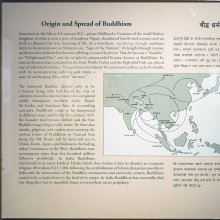Kura, Kūra, Kuṟa: 18 definitions
Introduction:
Kura means something in Hinduism, Sanskrit, Buddhism, Pali, the history of ancient India, Jainism, Prakrit, biology, Tamil. If you want to know the exact meaning, history, etymology or English translation of this term then check out the descriptions on this page. Add your comment or reference to a book if you want to contribute to this summary article.
Images (photo gallery)
In Hinduism
Kavya (poetry)
Source: archive.org: Naisadhacarita of SriharsaKūra (कूर) refers to “boiled rice”, and is mentioned in the Naiṣadha-carita 16.91, 107.

Kavya (काव्य, kavya) refers to Sanskrit poetry, a popular ancient Indian tradition of literature. There have been many Sanskrit poets over the ages, hailing from ancient India and beyond. This topic includes mahakavya, or ‘epic poetry’ and natya, or ‘dramatic poetry’.
Jyotisha (astronomy and astrology)
Source: Wisdom Library: Brihat Samhita by VarahamihiraKura (कुर) [=Kuru?] refers to a country belonging to “Madhyadeśa (central division)” classified under the constellations of Kṛttikā, Rohiṇī and Mṛgaśīrṣa, according to the system of Kūrmavibhāga, according to the Bṛhatsaṃhitā (chapter 14), an encyclopedic Sanskrit work written by Varāhamihira mainly focusing on the science of ancient Indian astronomy astronomy (Jyotiṣa).—Accordingly, “The countries of the Earth beginning from the centre of Bhāratavarṣa and going round the east, south-east, south, etc., are divided into 9 divisions corresponding to the 27 lunar asterisms at the rate of 3 for each division and beginning from Kṛttikā. The constellations of Kṛttikā, Rohiṇī and Mṛgaśīrṣa represent the Madhyadeśa or central division consisting of the countries of [i.e., Kura] [...]”.

Jyotisha (ज्योतिष, jyotiṣa or jyotish) refers to ‘astronomy’ or “Vedic astrology” and represents the fifth of the six Vedangas (additional sciences to be studied along with the Vedas). Jyotisha concerns itself with the study and prediction of the movements of celestial bodies, in order to calculate the auspicious time for rituals and ceremonies.
India history and geography
Source: Cologne Digital Sanskrit Dictionaries: Indian Epigraphical GlossaryKūra.—cf. a-kūra-chullaka-vināśi-khaṭvā-vāsa (IE 8-5); ex- plained as ‘boiled rice’; but probably ‘unboiled rice’. The villagers were obliged to supply it to the touring officers of the king. See vodā, siddha-anna. Note: kūra is defined in the “Indian epigraphical glossary” as it can be found on ancient inscriptions commonly written in Sanskrit, Prakrit or Dravidian languages.

The history of India traces the identification of countries, villages, towns and other regions of India, as well as mythology, zoology, royal dynasties, rulers, tribes, local festivities and traditions and regional languages. Ancient India enjoyed religious freedom and encourages the path of Dharma, a concept common to Buddhism, Hinduism, and Jainism.
Biology (plants and animals)
Source: Wisdom Library: Local Names of Plants and DrugsKura in the Hindi language is the name of a plant identified with Gymnosporia royleana Wall. ex M.A.Lawson from the Celastraceae (Spike-thorn) family having the following synonyms: Maytenus royleana, Euonymus spinosus, Celastrus royleanus. For the possible medicinal usage of kura, you can check this page for potential sources and references, although be aware that any some or none of the side-effects may not be mentioned here, wether they be harmful or beneficial to health.
Kura in the Hindi language is the name of a plant identified with Galium acutum Edgew. from the Rubiaceae (Coffee) family.
Source: Google Books: CRC World Dictionary (Regional names)1) Kura in Guinea is the name of a plant defined with Parinari excelsa in various botanical sources. This page contains potential references in Ayurveda, modern medicine, and other folk traditions or local practices It has the synonym Ferolia amazonica Kuntze (among others).
2) Kura in India is also identified with Cheilocostus speciosus It has the synonym Costus glabratus Rchb., nom. illeg. (etc.).
3) Kura is also identified with Digera alternifolia It has the synonym Amaranthus arvensis (Forssk.) K. Krause (etc.).
4) Kura is also identified with Holarrhena pubescens It has the synonym Echites antidysentericus Roth, nom. illeg., non Echites antidysentericus (L.) Roxb. ex Fleming (etc.).
5) Kura is also identified with Portulaca quadrifida It has the synonym Illecebrum verticillatum Burm. f. (etc.).
6) Kura is also identified with Saussurea costus It has the synonym Aucklandia lappa Decne. (etc.).
7) Kura is also identified with Tarenna asiatica It has the synonym Stylocoryna incerta (Koord. & Valeton) Elmer (etc.).
8) Kura is also identified with Wrightia antidysenterica It has the synonym Nerium zeylanicum L. (etc.).
Example references for further research on medicinal uses or toxicity (see latin names for full list):
· Memoirs of the Wernerian Natural History Society (1810)
· Species Plantarum (1753)
· Quarterly Journal of Chinese Forestry (1988)
· Meded. Lands Plantentuin (1902)
· Flora Brasiliensis (1860)
· Flora van Nederlandsch Indië (1855)
If you are looking for specific details regarding Kura, for example pregnancy safety, chemical composition, health benefits, extract dosage, side effects, diet and recipes, have a look at these references.

This sections includes definitions from the five kingdoms of living things: Animals, Plants, Fungi, Protists and Monera. It will include both the official binomial nomenclature (scientific names usually in Latin) as well as regional spellings and variants.
Languages of India and abroad
Pali-English dictionary
Source: BuddhaSasana: Concise Pali-English Dictionarykura : (nt.) boiled rice.
Source: Sutta: The Pali Text Society's Pali-English DictionaryKūra, (nt.) in sukkha° boiled rice (?) Vin. IV, 86; DhA. II, 171. (Page 225)

Pali is the language of the Tipiṭaka, which is the sacred canon of Theravāda Buddhism and contains much of the Buddha’s speech. Closeley related to Sanskrit, both languages are used interchangeably between religions.
Sanskrit dictionary
Source: DDSA: The practical Sanskrit-English dictionaryKūra (कूर).—Food, boiled rice; इतश्च कूरच्युततैलमिश्रं पिण्डं हस्ती प्रतिग्राह्यते मात्रपुरुषैः (itaśca kūracyutatailamiśraṃ piṇḍaṃ hastī pratigrāhyate mātrapuruṣaiḥ) Mṛcchakaṭika 4.
Derivable forms: kūraḥ (कूरः), kūram (कूरम्).
Source: Cologne Digital Sanskrit Dictionaries: Edgerton Buddhist Hybrid Sanskrit DictionaryKūra (कूर).—[, m.? see s.v. kuru.]
Source: Cologne Digital Sanskrit Dictionaries: Shabda-Sagara Sanskrit-English DictionaryKūra (कूर).—m.
(-raḥ) Boiled rice.
Source: Cologne Digital Sanskrit Dictionaries: Cappeller Sanskrit-English DictionaryKūra (कूर).—[neuter] boiled rice.
Source: Cologne Digital Sanskrit Dictionaries: Monier-Williams Sanskrit-English DictionaryKūra (कूर):—n. boiled rice, [Bhāvaprakāśa]
Source: Cologne Digital Sanskrit Dictionaries: Yates Sanskrit-English DictionaryKūra (कूर):—(raḥ) 1. m. Boiled rice.
Source: DDSA: Paia-sadda-mahannavo; a comprehensive Prakrit Hindi dictionary (S)Kurā (कुरा) in the Sanskrit language is related to the Prakrit words: Kurā, Kūra.
[Sanskrit to German]
Sanskrit, also spelled संस्कृतम् (saṃskṛtam), is an ancient language of India commonly seen as the grandmother of the Indo-European language family (even English!). Closely allied with Prakrit and Pali, Sanskrit is more exhaustive in both grammar and terms and has the most extensive collection of literature in the world, greatly surpassing its sister-languages Greek and Latin.
Prakrit-English dictionary
Source: DDSA: Paia-sadda-mahannavo; a comprehensive Prakrit Hindi dictionary1) Kurā (कुरा) in the Prakrit language is related to the Sanskrit word: Kuru.
2) Kurā (कुरा) also relates to the Sanskrit word: Kurā.
3) Kūra (कूर) also relates to the Sanskrit word: Krūra.
4) Kūra (कूर) also relates to the Sanskrit word: Kūra.
5) Kūra (कूर) also relates to the Sanskrit word: Kūra.
6) Kūra (कूर) also relates to the Sanskrit word: Īṣat.
Prakrit is an ancient language closely associated with both Pali and Sanskrit. Jain literature is often composed in this language or sub-dialects, such as the Agamas and their commentaries which are written in Ardhamagadhi and Maharashtri Prakrit. The earliest extant texts can be dated to as early as the 4th century BCE although core portions might be older.
Kannada-English dictionary
Source: Alar: Kannada-English corpusKura (ಕುರ):—
1) [noun] an inflamed pus-filled swelling caused by infection; a boil; an abscess.
2) [noun] something that pains, irritates a person; an irritant.
--- OR ---
Kura (ಕುರ):—[noun] the horny part of the foot of a horse, antelope, and other ungulates; the hoof.
--- OR ---
Kūra (ಕೂರ):—[adjective] = ಕೂರ್ [kur]5.
--- OR ---
Kūra (ಕೂರ):—
1) [noun] = ಕೂರ್ [kur]6.
2) [noun] (dial.) a domesticated carnivorous mammal, Canis familiaris, usu. having a long snout and non-retractile claws; a dog (as distinct from a bitch).
--- OR ---
Kūra (ಕೂರ):—[noun] cooked rice; any cooked food.
Kannada is a Dravidian language (as opposed to the Indo-European language family) mainly spoken in the southwestern region of India.
See also (Relevant definitions)
Starts with (+399): Kura pieak, Kura tamba, Kura-capaunu, Kura-garnu, Kura-katnu, Kura-khanu, Kura-makal-ilaeyini, Kuraa, Kuraala, Kuraala soppu, Kuraasaani, Kuraba, Kurabaka, Kurabakah, Kurabantuma, Kurabura, Kuraburanem, Kurac, Kuraca, Kuracana.
Ends with (+311): Abhilashankura, Acyuta thakkura, Acyutathakkura, Adavinellikura, Aelika-chaevi-kura, Akakura, Akkura, Akura, Akyerenkura, Amalamukura, Ambankura, Ambaracikura, Amukkura, Angkura, Ankura, Antarika-kura, Antila Majakura, Arasithakkura, Asanamkura, Avakura.
Full-text (+107): Krura, Dantakura, Antarika-kura, A-cullaka-kura-khatva-grahana, Raute-kura, Dirghakuraka, Route-kura, Kruradanti, Kuru, Ishat, A-kura-cullaka-vainashi-khatv-avasa, Vitakara, Kur, Sina-na-puccharako-kura, Bhanne-kura-maatr, Khatva, Vinashin, Avasa, Samvasa, Cullaka.
Relevant text
Search found 14 books and stories containing Kura, Kūra, Kurā, Kūra°, Kuṟa; (plurals include: Kuras, Kūras, Kurās, Kūra°s, Kuṟas). You can also click to the full overview containing English textual excerpts. Below are direct links for the most relevant articles:
Tiruvaymoli (Thiruvaimozhi): English translation (by S. Satyamurthi Ayyangar)
Pasuram 4.7.9 < [Section 7 - Seventh Tiruvaymoli (Cilam illac ciriyan)]
Mahabharata (English) (by Kisari Mohan Ganguli)
Guide to Tipitaka (by U Ko Lay)
Part I - Devadaha Vagga < [(c) Uparipannasa Pali]
Sutrakritanga (English translation) (by Hermann Jacobi)
Lecture 3: Knowledge of Food < [Book 2]
Naishadha-charita of Shriharsha (by Krishna Kanta Handiqui)
The Commentaries and the Text of the Naiṣadha < [Introduction]
The Religion and Philosophy of Tevaram (Thevaram) (by M. A. Dorai Rangaswamy)
Chapter 60 - Thirukachi Anegathangavatham or Tirukkacci Anekatankavatam (Hymn 10) < [Volume 3.5 - Pilgrim’s progress: to the North]
Chapter 52 - Thirukolakka or Tirukkolakka (Hymn 62) < [Volume 3.4 - Pilgrim’s progress: with Paravai]
Chapter 4.6 - (i) Symbology of the serpent and worship < [Volume 2 - Nampi Arurar and Mythology]



